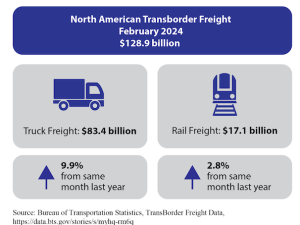CN Rail to reach weekly grain volume target
By: Reuters | Apr 14 2014 at 08:04 AM | Intermodal
Canadian National Railway Co, the country's biggest railroad, this week will reach the minimum weekly grain volume ordered by the government, easing a massive crop jam, Chief Executive Claude Mongeau said.
Mongeau, speaking to reporters after addressing a business audience in Winnipeg, said the company will move 500,000 tonnes of grain this week as required by a government order. The order also requires rival Canadian Pacific Railway Limited to move 500,000 tonnes this week.
Transport Canada spokeswoman Ashley Kelahear confirmed the railways were on course to reaching their targets as of March 29, the most recent data available.
The grain backlog is due to extreme circumstances, Mongeau said, such as a record 76 million tonne Western Canada crop and the most severe winter in decades.
"I'm sorry that we failed our customers, all of them, not just grain, (by) not being able to meet all their demands," Mongeau said. "But I don't control the weather."
Millions of tonnes of grain, worth up to C$20 billion ($18.3 billion), are sitting in country elevators and farm bins, with the railways behind on tens of thousands of car orders from grain handlers.
But the situation is improving.
The two railways boosted weekly port unloadings to 6,971 grain cars as of March 30, up nearly 15 percent from the previous week, said Mark Hemmes, president of Quorum Corp, a company that monitors Canada's grain transportation system for the federal government. That's the highest level since October.
"(The railways) are cranking it up," Hemmes said in an interview. "They're moving in the right direction."
The number of outstanding grain car orders by the two railways dropped 12 percent from the previous week to 68,802 cars as of Sunday, according to railway data, Hemmes said.
That backlog still represents some 6.15 million tonnes of crop that didn't move in the timing requested by grain handlers.
Part of the problem, Mongeau said, is grain handlers at times ordered far more cars than railways can realistically deliver.
CN shares eased slightly in Toronto on Wednesday.
Canadian Pacific spokesman Ed Greenberg said the company would not disclose its grain volumes to media, but that they comply with the government order.
Canadian government legislation moving through the House of Commons would give it authority to set minimum weekly levels of grain movement in coming years. The bill comes on the heels of government's order on March 7 that the railways ramp up to moving a combined 1 million tonnes of grain per week on up to 11,000 cars.
Railways have taken the brunt of criticism from politicians and farmers, but Mongeau said grain handlers also bear responsibility.
They ordered too few grain cars during the first weeks of August as the big crop matured and too many later on, he said. While CN delivered fewer than average grain cars for loading during the harsh winter, it reached record-high levels at times in autumn and spring, Mongeau said.
The harvest was later than normal, and farmers were not focused on delivering their crops to elevators until early September, said Wade Sobkowich, executive director of the Western Grain Elevator Association.
Mongeau said once this crop gets moved, CN would consider increasing capacity, but only if grain handlers do the same.
"Even if we had more assets, the grain elevator companies would have difficulty unloading it," he said.
Mongeau said further regulation would damage Canada's economy, but he said if Ottawa is going to impose it on railroads and grain, it should also further regulate grain handling companies and even other commodities.
Currently, potash, coal and lumber are not being hurt by the mandate to move grain, but that could change in the case of a flood or other disruption, Mongeau said. (Reuters)







